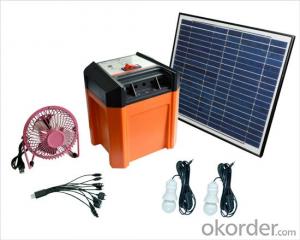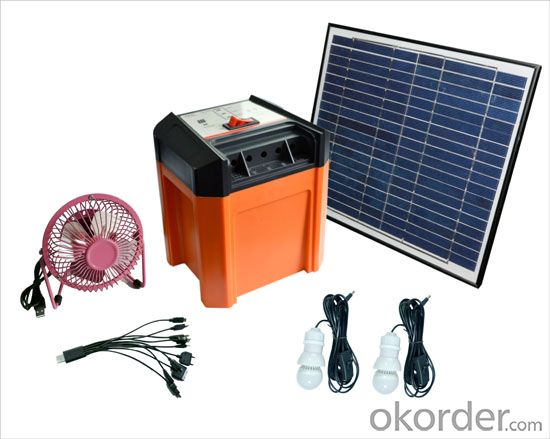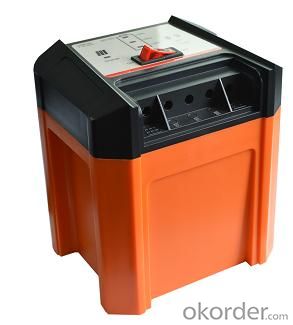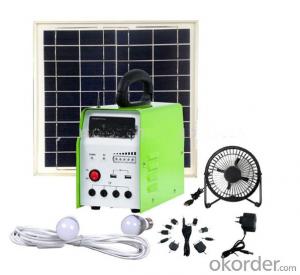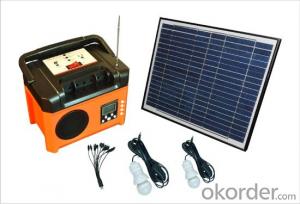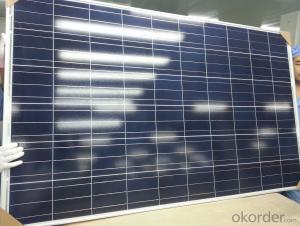Solar Energy Systems Dallas County:Solar Power System with Built-in Battery and USB
- Loading Port:
- Shekou
- Payment Terms:
- TT OR LC
- Min Order Qty:
- 50 unit
- Supply Capability:
- 5000 unit/month
OKorder Service Pledge
OKorder Financial Service
You Might Also Like
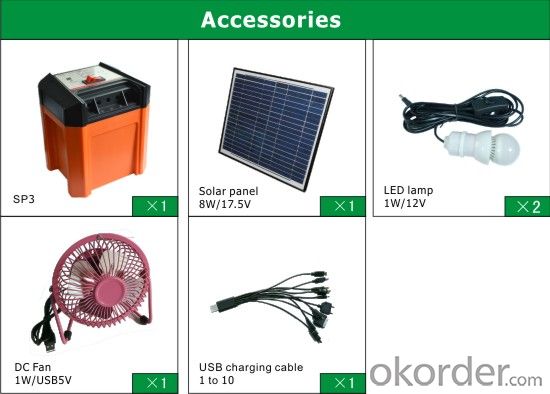
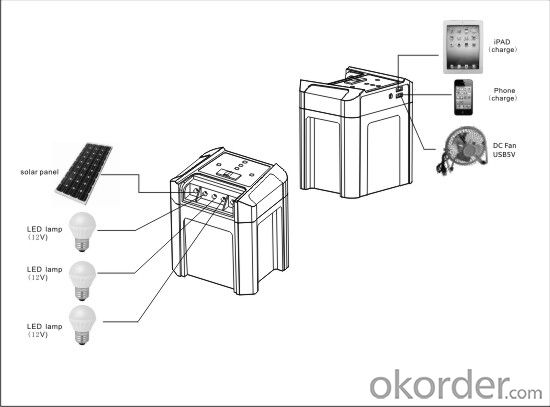
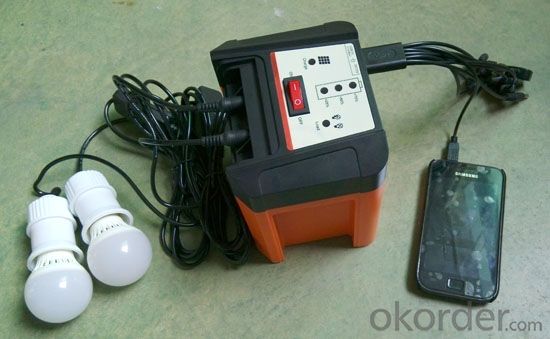
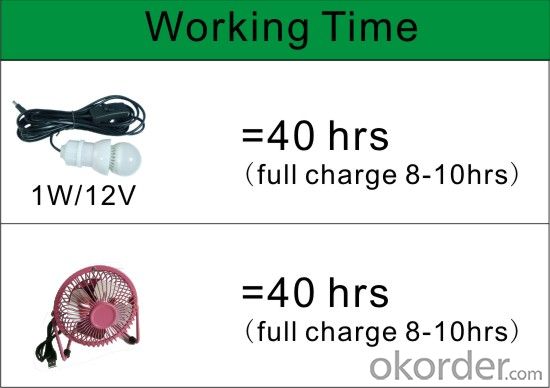
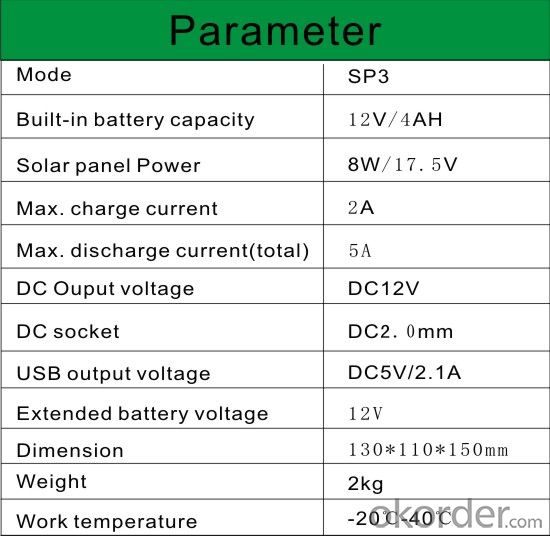
This system designed to provide DC power supply for power lighting,mobile phone charging,run the DC Fan and Radio,etc
Built-in maintenance-free Lead-acid battery
Adopt the latest PWM Control modulation,real time display of battery capacity and load status.
With several output socket,can output voltage DC 12V and DC 5V at the same time.
It can charged by solar panel
Voice warning and together LED indicator shows the battery get low.
Bulit-in battery capacity:12V/4AH
Solar panel power:8W/17.5V
Max.discharge current(total):5A
Max.charge current:2A
DC Output voltage:DC12V
Weight:2KG
Work temperature:-20-40
USB output voltage:DC5V/2.1A
DC socket:DC2.5mm
- Q: Can solar energy systems be used in powering religious institutions like churches or temples?
- Certainly, churches or temples can utilize solar energy systems to power their operations. These buildings are particularly suitable for solar power due to their spacious roofs that can accommodate solar panels. By installing these systems, religious institutions can significantly decrease their electricity expenses, save money, and become more sustainable. Sunlight is converted into usable energy by solar panels, which can then be employed to fulfill the religious institution's lighting, heating, cooling, and other electrical requirements. Recent advancements in solar technology have made it possible to store surplus energy in batteries, ensuring uninterrupted power even on cloudy days or during the night. The usage of solar energy not only reduces the operational costs of religious institutions but also aids in reducing their carbon footprint. By minimizing reliance on fossil fuels, solar power systems contribute to mitigating climate change and advocating for environmental stewardship. This resonates with the core principles of numerous religious organizations that emphasize the significance of environmental sustainability and responsible Earth stewardship. Moreover, solar energy systems can serve as visible demonstrations of the religious institution's dedication to sustainable practices, inspiring both members and the wider community to adopt renewable energy solutions. By embracing solar power, religious institutions can showcase their commitment to caring for the planet and encourage others to do the same. To summarize, solar energy systems can effectively power religious institutions such as churches or temples. They present an eco-friendly and economical solution that aligns with the values of many religious organizations. By embracing solar power, these institutions can reduce their energy costs, promote sustainability, and inspire their members and the community to embrace clean energy solutions.
- Q: Can solar energy systems be used in areas with limited space?
- Yes, solar energy systems can be used in areas with limited space. There are various compact and space-efficient solar panels available, such as rooftop solar panels, solar awnings, and solar tiles, which can be installed in small areas. Additionally, advancements in technology have led to the development of flexible and portable solar panels that can be used in areas where traditional panels may not be suitable.
- Q: How do solar energy systems impact wildlife?
- Solar energy systems have a generally positive impact on wildlife. Unlike other forms of energy generation, solar systems do not produce harmful emissions or pollutants that can harm wildlife habitats. However, the installation of solar farms may require clearing land, which can disrupt local ecosystems. Additionally, solar panels can create shade, altering the microclimate for certain species. Nevertheless, these impacts are typically minimal and can be mitigated through proper planning and design. In some cases, solar farms can even provide new habitats for certain wildlife species, such as birds or pollinators.
- Q: Can solar energy systems be used in areas with limited access to solar surge protection devices?
- Yes, solar energy systems can be used in areas with limited access to solar surge protection devices. While surge protection devices are important for protecting solar panels and other system components from power surges and voltage spikes, there are alternative methods to mitigate the risks. These can include using high-quality solar inverters with built-in surge protection, implementing proper grounding techniques, and adhering to best practices in system design and installation. Although having access to surge protection devices is ideal, it is not a definitive requirement for the deployment of solar energy systems in areas with limited access to such equipment.
- Q: Can solar energy systems be installed on ground-mounted structures?
- Yes, solar energy systems can be installed on ground-mounted structures. These structures provide a stable and efficient platform for solar panels, allowing them to be positioned at an optimal angle for capturing sunlight. Ground-mounted systems are often used in areas where roof space is limited or not suitable for installation, making them a popular choice for residential, commercial, and utility-scale solar projects.
- Q: What is the impact of saltwater spray on solar panels?
- Saltwater spray can have several impacts on solar panels. Firstly, the salt in the spray can create a layer of residue on the surface of the panels, which can reduce their overall efficiency. This residue acts as a barrier, preventing sunlight from reaching the photovoltaic cells and reducing the amount of electricity that can be generated. Secondly, the corrosive nature of saltwater can lead to the degradation of the materials used in solar panels. Over time, the salt can cause the metal components and connections in the panels to corrode and weaken, potentially leading to malfunctions or even complete failure of the panels. Additionally, saltwater spray can also affect the structural integrity of the panels. The constant exposure to saltwater can cause the materials to deteriorate, leading to cracks, warping, or other forms of physical damage. This can not only impair the performance of the panels but also pose safety risks. To mitigate the impact of saltwater spray on solar panels, it is essential to regularly clean and maintain them. This involves removing the salt residue and ensuring that the panels are free from any accumulated debris. Proper cleaning techniques and regular inspections can help prolong the lifespan of the panels and maintain their efficiency. Furthermore, selecting solar panels specifically designed for coastal or marine environments can provide added protection against saltwater spray. These panels are often constructed with materials that are more resistant to corrosion and have enhanced durability to withstand the harsh conditions. In conclusion, saltwater spray can have a negative impact on solar panels by reducing their efficiency, corroding their components, and compromising their structural integrity. However, with proper maintenance and the use of suitable panels, these effects can be minimized, allowing solar energy systems to continue operating effectively even in coastal or marine environments.
- Q: What is the impact of roof orientation on the performance of solar panels?
- The impact of roof orientation on the performance of solar panels is significant. The orientation of the roof determines the amount of sunlight that the panels receive throughout the day. Ideally, solar panels should be installed on roofs that face south in the northern hemisphere and north in the southern hemisphere for maximum exposure to sunlight. East and west-facing roofs can still generate electricity, but their output may be lower. Additionally, the tilt angle of the roof can also affect the performance of solar panels. By optimizing roof orientation and tilt, the efficiency and productivity of solar panels can be greatly enhanced.
- Q: Can solar energy systems be used in areas with heavy snowfall?
- Yes, solar energy systems can be used in areas with heavy snowfall. However, it is important to design and install the system properly to account for the snow load and ensure maximum efficiency. Additionally, regular maintenance and snow removal may be required to optimize performance during winter months.
- Q: Can solar energy systems be used for powering industrial processes?
- Yes, solar energy systems can certainly be used for powering industrial processes. Solar power has gained popularity in recent years as a sustainable and renewable energy source. Industrial processes often require a significant amount of energy, and solar power can be harnessed to meet these demands. There are several ways in which solar energy systems can be utilized for industrial processes. One common method is through the installation of solar photovoltaic (PV) panels. These panels convert sunlight directly into electricity, which can then be used to power various industrial machinery and equipment. By integrating solar PV systems into the existing infrastructure, industries can reduce their dependence on traditional fossil fuels and lower their carbon footprint. In addition to generating electricity, solar thermal systems can also be used to power industrial processes. Solar thermal technology uses the sun's heat to produce steam, which can then drive turbines or provide direct heat for industrial applications. This method is particularly useful for industries that require high-temperature processes, such as manufacturing, chemical production, or food processing. Implementing solar energy systems for industrial processes offers numerous benefits. Firstly, it helps to reduce greenhouse gas emissions and combat climate change. Solar power is a clean energy source that releases no harmful pollutants or greenhouse gases during operation. By transitioning to solar energy, industries can contribute to a more sustainable and environmentally friendly future. Moreover, utilizing solar power can help industries save on energy costs in the long run. While the initial investment for installing solar energy systems may be high, the operational costs are significantly lower compared to traditional energy sources. Once the systems are in place, industries can benefit from reduced electricity bills and even generate excess energy that can be sold back to the grid. Lastly, solar energy systems offer a reliable and resilient power source. They can operate even in remote areas or during power outages, ensuring uninterrupted production processes. Additionally, solar panels have a long lifespan and require minimal maintenance, making them a viable long-term solution for industrial power needs. In conclusion, solar energy systems can indeed be used for powering industrial processes. With the advancements in solar technology and the increasing focus on sustainability, more and more industries are embracing solar power to meet their energy demands. By harnessing the sun's energy, industries can reduce their environmental impact, save on energy costs, and ensure a reliable and resilient power supply for their industrial processes.
- Q: Are solar energy systems cost-effective?
- Yes, solar energy systems are cost-effective in the long run. While the initial installation cost may be higher, solar power helps reduce electricity bills significantly over time. Additionally, solar energy systems require minimal maintenance, have a long lifespan, and can generate excess energy that can be sold back to the grid, further enhancing their cost-effectiveness.
Send your message to us
Solar Energy Systems Dallas County:Solar Power System with Built-in Battery and USB
- Loading Port:
- Shekou
- Payment Terms:
- TT OR LC
- Min Order Qty:
- 50 unit
- Supply Capability:
- 5000 unit/month
OKorder Service Pledge
OKorder Financial Service
Similar products
Hot products
Hot Searches
Related keywords
